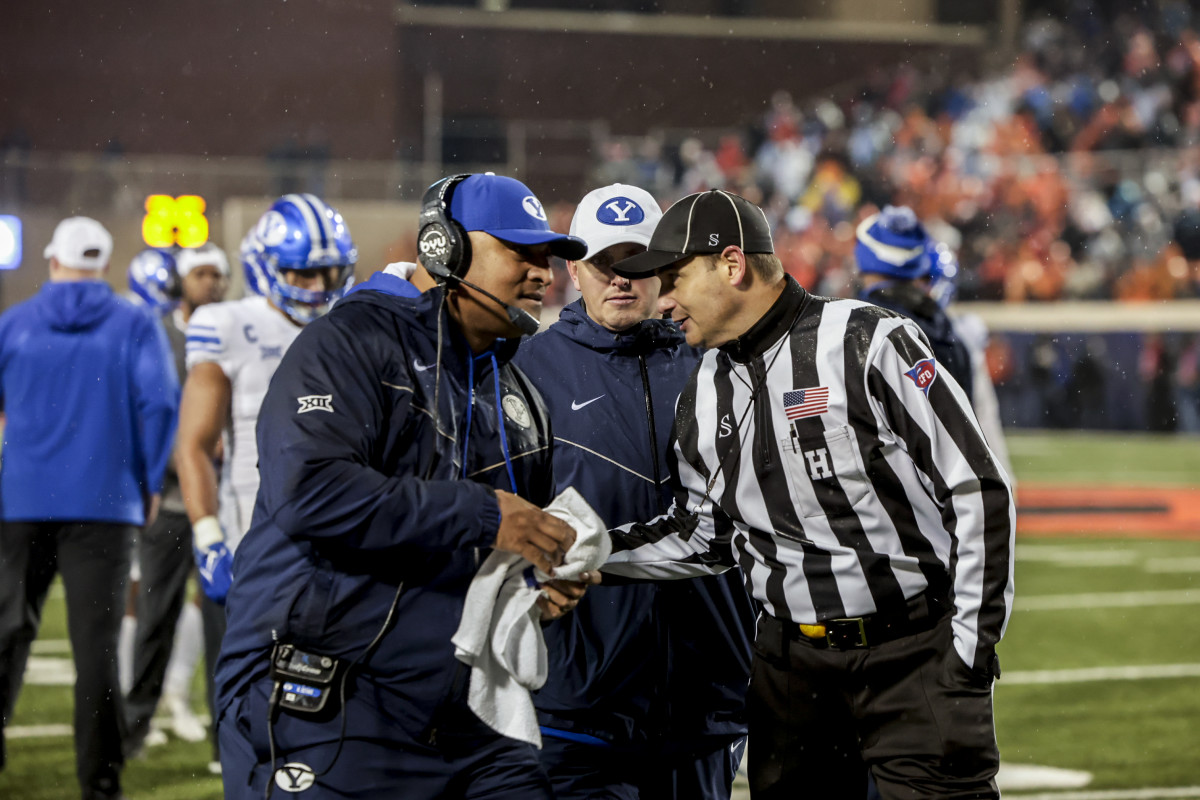Takeaways From BYU’s Inaugural Big 12 Season
BYU wrapped up the 2023 season with a loss to Oklahoma State. The loss eliminated BYU from bowl eligibility and started the offseason earlier than anticipated in Provo.
1. Competing for a Big 12 championship is going to take some time
In an interview with Berry Tramel a few weeks ago, BYU Athletic Director Tom Holmoe said BYU was getting “bloodied” in Big 12 play. He was right - especially at the time. BYU was coming off three blowout losses to Texas, West Virginia, and Iowa State. The blowout against Texas? Understandable. The blowout at West Virginia? Disappointing for sure, but in a tough environment across the country? It happens - especially to a in its first year as a Power Five program. The embarrassing loss to Iowa State? Inexcusable.
On the bright side, BYU played much better in the last two games of the season. The coaches deserve credit for turning things around and making in-season improvements. Still, the Cougars ran out of gas and were unable to close out either game to reach bowl eligibility.
BYU wasn't close to competing for a championship this year, and they probably won't be close next year either. That's ok, at least for now. But working towards a championship and playoff spot needs to be the goal. Incremental improvements and working towards a championship trajectory is critical next season.
2. BYU needs more talent
With all due respect to the players on the 2023 roster, BYU needs more talent. Everything from depth to top-end talent, BYU's talent was exposed this season. That was expected during the Big 12 transition, but now it needs to start improving as soon as next season. That starts on the recruiting trail. BYU's recruiting is improving, especially on defense, but it's still not where it needs to be to consistently compete for championships.
To be fair, BYU's improved recruiting started to manifest itself on the field this year, it's just not where it needs to be yet. For example, a few freshmen emerged as players to build around in the future. Siale Esera is a future star (he was the highest-graded player on the team - minimum 100 snaps). Harrison Taggart looks like a multi-year starter. Marcus McKenzie impacted the game on special teams while veterans like Kamden Garrett and Eddie Heckard started at corner. LJ Martin was BYU's most productive running back for most of the season. Jojo Phillips has the talent to be very, very good for BYU. Ace Kaufusi made some nice plays in the season finale. Raider Damuni showed flashes despites some ups and downs.
What do those players have in common? They were some of the more highly-coveted recruits that BYU has signed. In this era of college football, stars matter at a macro level. The higher you rank in the recruiting rankings, the better you will be on average. There are exceptions at a micro level, but the star system is getting better and better at grading team talent. It's no surprise that the higher-rated recruits were the ones playing critical snaps for BYU this season. Now, BYU needs more, highly-rated recruits.
The 2023 class was a step in the right direction, but it wasn't enough. Now BYU needs to begin stacking better and better recruiting classes each year.
3. Aaron Roderick needs a mobile quarterback

BYU’s rush attack was on an historically bad trajectory with Kedon Slovis under center. The Cougars were on pace to run for less than 1,000 yards. For context, the Cougars have not rushed for less than 1,000 yards in a season since World War II.
It was no surprise that offensive line coach Darrell Funk was dismissed after the season. The offensive line woefully underperformed relative to preseason expectations. The rushing attack improved immensely, however, when Jake Retzlaff took over at quarterback. Even the threat of a running quarterback opened up holes in the running game.
Roderick has had success at BYU with this system in the past, but he always succeeded with a quarterback that could move around. It's clear that Roderick needs a quarterback that can at least threaten the defense with his legs. Roderick's sequential play-calling relies on a proficient rushing attack. Without it, the offense can become stale and predictable in a hurry.
Roderick will be retained on the staff next year. He has one year to fix the issues and turn things around. If he can find a quarterback that better fits his system, he can turn things around by next season.
4. BYU needs to bring in a transfer QB
Speaking of quarterbacks, keep your eye on transfer quarterbacks over the next few weeks. BYU needs to bring in a transfer quarterback, preferably one with multiple years of eligibility remaining.
Jake Retzlaff had his ups and downs, but he didn't show enough to be "the guy" going into next year. Could he improve and become the starter in the future? Sure - but he would need to clean up some mechanics, make some better reads, and fix the turnovers. In the meantime, BYU can't rely on Retzlaff going into next year. BYU needs to add a starting-caliber player to the room from the portal. That's easier said than done, but Aaron Roderick has to get this one right. His job might depend on it.
BYU will also welcome Texas native Noah Lugo to the quarterback room next year. Lugo has the skillset to be a future starter at BYU, but it's never wise to rely on a true freshman to start at quarterback. Lugo is probably a year or two away from being ready to start.
5. Jay Hill is going to get his defense going
The defense wasn't where it needs to be, but it was clearly better in 2023 than it was in 2022. The talent isn't there to execute Jay Hill's scheme today, but they will get there over the next few years.
A young core is forming on the defensive side of the ball. Siale Esera, Harrison Taggart, and Ace Kaufusi look like a formidable linebacking core in the future. BYU is bringing in some of the best defensive back recruits in recent history in Therrian Alexander and Jonathan Kabeya.
The defense is trending up. In the words of Jon Rothstein: buy stock now. Jay Hill is the right man for the job.
6. Can’t take your foot off the gas with a lead in the Big 12

The Big 12 was the most volatile Power Five league in the country this season. That probably won't be unique to this year - the Big 12 looks to be the conference of chaos in the future. Any team can win on any given Saturday.
What did we learn? You can't take your foot off the gas with a lead. Just ask UCF - the Knights gave up a 35-7 lead in the second half in a 36-35 loss to Baylor.
BYU took their foot off the gas against Oklahoma State and paid the price. Comebacks happen in college football, but it became a disconcerting trend at BYU this season. Fans will remember the blown lead against Oklahoma State, but it nearly happened against Texas Tech as well. BYU had a three-score lead in the second half before going conservative and allowing the Red Raiders to get back in the game. Tech was on the verge of making it a one-score game before Jake Strong threw a costly interception on BYU's side of the field. The Cougars punted the ball away on four out of five possessions in the second half.
Against Cincinnati, BYU was knocking on the door of a three-score lead in the second half. That game ended as a one-score game and BYU needed to recover an onside kick to secure the win.
When BYU gets a lead in the future, they have to deliver the blowout punch. Gone are the days where BYU's opponents will roll over and die - that was common in the Mountain West. The teams in the Big 12 have the talent to change a game in one or two plays.
7. Everything in the program needs to be re-evaluated
At the end of the day, 5-7 isn't good enough. BYU's weaknesses were exposed this season. As a result, everything about the program needs to be re-evaluated. BYU has to find ways to improve in every area possible.
Even the simple things need to be re-evaluated. The grass at Lavell Edwards Stadium was nearly unplayable in November. That can't happen.
The cleats against Iowa State put BYU at a clear disadvantage. That definitely can't happen.
BYU came out flat in multiple games this season. That has to change.
BYU allowed non-offensive touchdowns too many times to count this season.
The small things accumulated this year and became big issues that impacted games. Kalani Sitake has to get into the details and diagnose the problems and fix them. At the end of the day, those failures fall on him.
8. Kalani Sitake is the right man for the job

Like we've mentioned in this article, various things around the program need to improve. Regardless, Kalani Sitake is still the right man to lead the Cougars in the Big 12. Sitake has shown that he can diagnose problems and turn things around in the past, and he can do it again. It might take a few years, but Sitake has the potential to get this program at a championship-caliber level.
All hope was lost after the Iowa State game. Sitake was able to rally the locker room and get them to play much better against the two Oklahoma schools. Not every coach in college football would be able to do that. Sitake has a unique skillset and, as a result, a high ceiling. Now he just needs to help BYU reach its potential.
